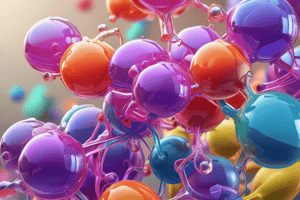Podcast
Questions and Answers
What is the primary characteristic of alkanes at room temperature?
What is the primary characteristic of alkanes at room temperature?
- They readily form multiple bonds.
- They are stable and unreactive. (correct)
- They only react in the presence of acids.
- They are highly reactive.
Which of the following best describes halogenation?
Which of the following best describes halogenation?
- Formation of ethers from alkanes.
- Addition of hydrogen atoms to an alkane.
- Replacement of hydrogen atoms with halogens. (correct)
- Elimination of halogens from alkanes.
What type of reaction mechanism is employed in the halogenation of alkanes?
What type of reaction mechanism is employed in the halogenation of alkanes?
- Electrophilic addition.
- Free radical substitution. (correct)
- Nucleophilic substitution.
- Electrocyclic reaction.
Under what conditions does the halogenation of alkanes occur?
Under what conditions does the halogenation of alkanes occur?
In the chlorination of methane, what is produced during the initiation step?
In the chlorination of methane, what is produced during the initiation step?
Which halogen has the highest reactivity in the halogenation of alkanes?
Which halogen has the highest reactivity in the halogenation of alkanes?
Flashcards are hidden until you start studying
Study Notes
Alkanes and Reactivity
- Alkanes are generally unreactive and stable at room temperature.
- Alkanes are often called paraffins, which means lacking affinity for other substances.
Halogenation
- Halogenation is the replacement of one or more hydrogen atoms in an organic compound with a halogen (fluorine, chlorine, bromine, or iodine).
- The halogenation of an alkane is a free radical substitution reaction.
- A C-H bond is broken, and a new C-X bond is formed.
- This reaction only occurs in the presence of heat or UV light; no reaction takes place in the dark.
Halogenation Reaction
-
RH + X2 ⭢ RX + HX
- RH: An alkane
- X2: Halogen (Cl2, Br2, etc.)
- RX: Alkyl halide
- HX: Hydrogen halide (HCl, HBr, etc.)
- X: Chlorine (Cl) or Bromine (Br)
Reactivity
- Cl2 is more reactive than Br2.
Chlorination of Methane
- Initiation: Cl2 → 2Cl (radicals created)
Studying That Suits You
Use AI to generate personalized quizzes and flashcards to suit your learning preferences.




